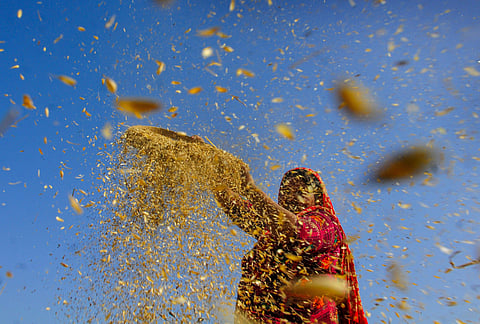

MUMBAI: The ban on wheat exports is only "marginally positive" for the domestic inflation outlook, a British brokerage said on Tuesday.
The ongoing heatwave poses "significant risks" to the wheat output, and the government's surprise move to ban the exports will ease domestic price concerns only at the margins, analysts at Barclays said.
Firming prices of the grain aggravating the already uncomfortable inflation situation was speculated as one of the reasons for the surprise move from the government to ban wheat exports. The headline inflation accelerated to nearly 8 per cent in April and is expected to stay elevated for some more time.
Already, there have been a slew of moves by Indian policymakers to contain inflation like a surprise hike in lending rates before the export ban. "Wheat export ban marginally positive for domestic inflation outlook," the analysts said, adding that a 10 per cent rise in domestic wheat prices pushes up the headline inflation by 0.27 per cent.
The report said the move by India - which was one of the key suppliers of wheat following the Russian invasion of Ukraine - is akin to similar ones by Indonesia (which banned palm oil exports) and Serbia and Kazakhstan (on food grains).
Till now, wheat prices in the domestic market have risen only by 3 per cent as against a 44 per cent rise globally since February 24, when the invasion began.
The British brokerage said if not for the ban, it would have been difficult for the government to achieve the target of 10 million tonnes without putting pressure on domestic prices as it has entered the financial year with a buffer stock of only 19 million tonnes of wheat.
The potential downside to wheat production this year because of the heat wave could wipe out the small surplus that the country has enjoyed over the past few years, which perhaps influenced the decision to ban exports, it said.
It also noted that the government recently slashed its estimate of wheat output for FY22-23 to 105 million tonnes from the prior estimate of 111.23 million tonnes.
"We think the export ban was triggered by a tightening in domestic wheat demand-supply dynamics, which could have pushed up wheat prices and aggravated food inflation," it said.